Is English a global language 英语是否为全球性语言
写一篇我对英语作为世界语言的看法英文作文
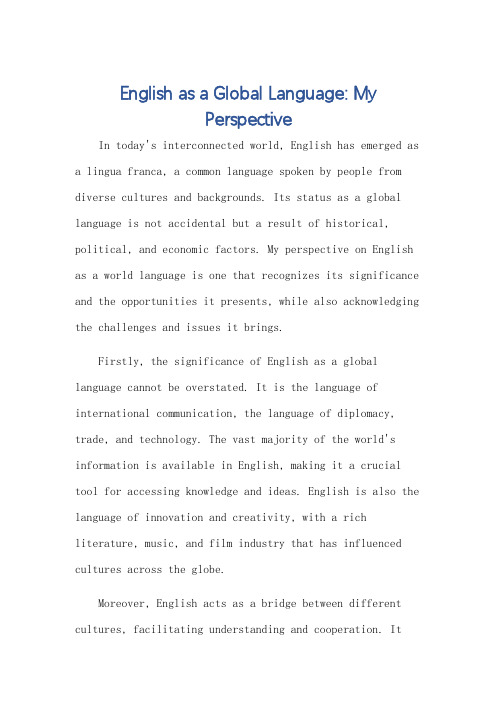
English as a Global Language: MyPerspectiveIn today's interconnected world, English has emerged as a lingua franca, a common language spoken by people from diverse cultures and backgrounds. Its status as a global language is not accidental but a result of historical, political, and economic factors. My perspective on English as a world language is one that recognizes its significance and the opportunities it presents, while also acknowledging the challenges and issues it brings.Firstly, the significance of English as a global language cannot be overstated. It is the language of international communication, the language of diplomacy, trade, and technology. The vast majority of the world's information is available in English, making it a crucial tool for accessing knowledge and ideas. English is also the language of innovation and creativity, with a rich literature, music, and film industry that has influenced cultures across the globe.Moreover, English acts as a bridge between different cultures, facilitating understanding and cooperation. Itallows people from different parts of the world to communicate and collaborate effectively, breaking down barriers and fostering global unity. In today's interconnected world, this is crucial for promoting peace and stability.However, the dominance of English as a global language also presents some challenges. One of the main issues is the exclusion of non-English speaking communities. While English may be the language of international communication, it is not the native language of everyone. This can create a communication barrier for those who do not speak English fluently, limiting their access to information and opportunities.Additionally, the dominance of English can also lead to the marginalization of other languages and cultures. Languages are a crucial part of a culture's identity and heritage, and the loss of languages can lead to the loss of cultural diversity. It is important to preserve and promote other languages alongside English to maintain cultural balance and diversity.Moreover, the use of English as a global language can also lead to linguistic homogenization, with many languages being influenced or even replaced by English. This can erode the linguistic diversity of the world, leading to a loss of unique cultural expressions and ways of thinking. In conclusion, my perspective on English as a world language is one that recognizes its significance and opportunities but also acknowledges the challenges and issues it brings. While English is an essential tool for global communication and cooperation, it is important to promote linguistic diversity and cultural inclusivity. We should strive to create a world where different languages and cultures can coexist and thrive, rather than one where English dominates. By doing so, we can build a more inclusive and harmonious global community.**英语作为全球语言的看法**在当今相互联系的世界中,英语已经成为了一种通用语言,被来自不同文化和背景的人们所使用。
ENGLISH AS A WORLD LANGUAGE 英语是一门世界语言

ENGLISH AS A WORLD LANGUAGEThe English language spread as Britain expanded its colonial empire from the 1600s on and established legal, military, and educational systems in many countries along English lines. British expansion ended after World War II (1939-1945), when many of its colonies sought independence. Since World War II American English has dominated as a world language, largely because of U.S. economic and political influence and the advance of technology, especially computing and the Internet. At the turn of the 21st century, English prevailed as the most widely used language internationally.At the same time as English became a world language, the number of English speakers learning a second language dropped substantially. Even more disturbingl y, English was blamed for the “death” of some minority languages, such as Gaelic and various Australian aboriginal languages (see Aboriginal Australians). Various measures are needed to protect these smaller languages from disappearing.The English language seems set to dominate world communications for some time to come. Although dominance brings with it a degree of standardization, it is not the case that English is losing its variety, either within countries or across the globe. Current research suggests that, rather than dwindling, differences in vocabulary, grammar, and pronunciation continue to allow people to express multiple identities. The fear of some linguists that mass communications would lead to the death of English dialects appears to be unfounded.。
关于英语是通用的,一门全球性语言的感想

关于英语是通用的,一门全球性语言的感想在全球化背景下,英语发展为一门国际通用语(English as a lingua franca,ELF)(文秋芳20xx)已成为世界融合浪潮中的必然趋势。
英语不仅作为母语在英语本族语者中使用,而且更多地作为必要交际工具被非英语母语者应用,英语全球化已成既定事实。
经济全球化和区域一体化在语言方面导致的结果之一是非英语母语者人数现在已远超英语母语者(Crystal 20xx)。
正如Kachru(1985)提出的世界英語三个同心圈框架(Three concentric circles of English),以英语为二语或官方语言的“外圈国家”的英语使用人数已大大超过“内圈国家”的英语母语者。
鉴于此,本文在回顾英语全球化的过程基础上,尝试探讨英语作为国际通用语在跨文化交际视角下的新型学习标准及学习方法,并就如何制定适应性更强的语言学习观提出相应建议。
2、英语学习者学习标准的转变无论是在16世纪的殖民扩张时期还是英语成为国际通用语的今天,英语学习者的目标都是传达信息,顺利完成交际,但是英语学习者的学习标准发生了转变——由单一的英式和美式英语标准逐渐转变为较为灵活的符合多元化交际的标准。
究其原因,在单一标准下,英语学习者的交际对象主要为英语母语者,尤其是美、英两国。
因此,他们的输入也大多限于英式、美式标准英语,同时在使用时还需遵循英、美国家的文化和语言习俗(闫艳20xx)。
但随着英语全球化的发展,英语学习者的交际对象也不再仅仅是以英语母语者,而是来自世界各国的英语使用者。
英语不再是本族语者的专利,而成为世界各国相互沟通和交流的工具。
这一世界语言格局的变化对英语教学和英语学习标准产生了深刻的影响。
很显然,在全球化快速发展以及英语使用区域扩大的背景下,过去单一的英语学习标准已不再适用(陈新仁、李民20xx)。
相应地,较为灵活的符合多元化交际的学习标准应运而生。
由于依附于不同的语言文化背景,英语非本族语者之间的交际容易缺乏充足的共同背景或共知前提,这便需要双方共同构建临时的语境信息,使其成为交际主体之间的共知背景,从而顺利完成交际(冉永平、杨青20xx;Cogo & Dewey 20xx)。
你觉得在你未来当中英语重要吗英语作文

你觉得在你未来当中英语重要吗英语作文I believe that English is very important for my future. 我相信英语对我的未来非常重要。
As a global language, English is widely used in business, science, education, and communication. 作为一种全球性语言,英语被广泛用于商业、科学、教育和交流。
It opens up many opportunities and provides access to a wealth of knowledge and information. 它为我提供了许多机会,并且让我获得了丰富的知识和信息。
In terms of education, English is crucial for accessing a wide range of resources and study materials. 在教育方面,英语对于获取各种资源和学习材料至关重要。
Many academic journals, books, and online courses are available only in English. 许多学术期刊、书籍和在线课程都只能用英语阅读。
By mastering English, I can broaden my academic horizons and keep up with the latest developments in my field of study. 通过掌握英语,我可以拓宽学术视野,跟上我所研究领域的最新发展。
Moreover, English proficiency is a valuable asset in the job market. 此外,英语水平高在就业市场上是一种宝贵的资产。
国际间的语言沟通英语的全球地位与影响

国际间的语言沟通英语的全球地位与影响在全球范围内,英语作为一种国际间的语言沟通工具拥有着极其重要的地位和广泛的影响力。
本文将探讨英语的全球地位及其对国际间的语言沟通产生的影响。
一、英语的全球地位1.1 英语作为官方语言在许多国家中,英语被正式确定为官方语言或共同语言。
例如,英国、美国、加拿大和澳大利亚等英语国家,以及许多非英语国家如印度和新加坡等,都将英语作为其官方语言。
这使得英语具备了国际间的通用性和可操作性。
1.2 英语在国际组织中的地位英语在国际组织中也扮演着重要的角色。
全球性组织如联合国、世界贸易组织等大多以英语作为工作语言。
无论是会议、文件记录还是交流沟通,英语都是必备的。
这使得英语成为国际间最为普遍并广泛使用的语言之一。
1.3 英语的教育地位国际间对英语教育的重视程度不言而喻。
在不少国家,英语已被纳入学校的必修科目,并且成为大学录取的必备条件之一。
世界各地的学生都努力学习英语,以便能够更好地与其他国家的人进行交流和合作。
二、英语的全球影响2.1 商业与经济影响全球化的趋势使得英语在商业和经济领域产生了巨大的影响。
英语不仅成为国际商务谈判和合作的工具,也是世界各国企业之间沟通的重要媒介。
掌握英语的人们在全球商业竞争中更具竞争力,他们能够更好地适应国际市场的需求和变化。
2.2 文化的传播英语的广泛使用为大量的文化输出提供了平台。
通过英语,英美等国的文化、艺术和娱乐产品得以迅速传播到全球。
从音乐、电影到文学作品,英语成为了人们接触外国文化的窗口。
同时,其也为全球各地的人们提供了了解和体验其他文化的机会。
2.3 科学研究领域的影响英语在科学研究领域的影响力不可忽视。
大量的科学研究成果以英语为媒介发布和交流,科学家们能够通过英语期刊、会议等渠道分享他们的研究成果。
这种全球化的科学交流促进了科学合作和创新,推动了科技的进步。
三、英语的全球地位及影响的挑战3.1 语言多样性的保护随着英语的全球地位不断加强,一些国家对本土语言和文化的担忧也逐渐浮现。
英语全球通用的语言
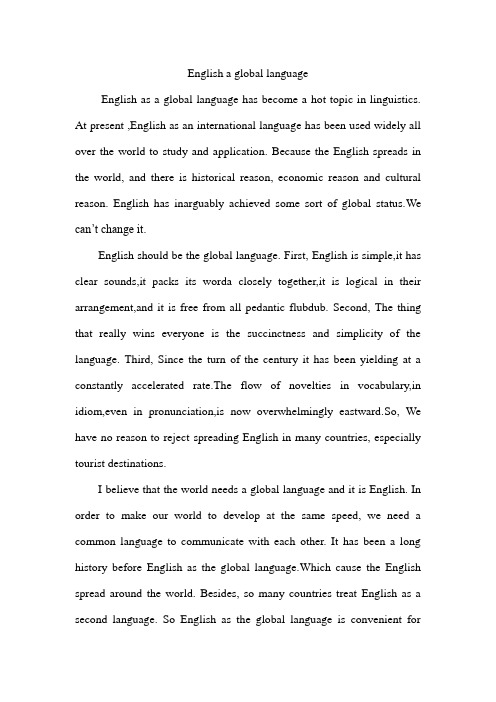
English a global languageEnglish as a global language has become a hot topic in linguistics. At present ,English as an international language has been used widely all over the world to study and application. Because the English spreads in the world, and there is historical reason, economic reason and cultural reason. English has inarguably achieved some sort of global status.We can’t change it.English should be the global language. First, English is simple,it has clear sounds,it packs its worda closely together,it is logical in their arrangement,and it is free from all pedantic flubdub. Second, The thing that really wins everyone is the succinctness and simplicity of the language. Third, Since the turn of the century it has been yielding at a constantly accelerated rate.The flow of novelties in vocabulary,in idiom,even in pronunciation,is now overwhelmingly eastward.So, We have no reason to reject spreading English in many countries, especially tourist destinations.I believe that the world needs a global language and it is English. In order to make our world to develop at the same speed, we need a common language to communicate with each other. It has been a long history before English as the global language.Which cause the English spread around the world. Besides, so many countries treat English as a second language. So English as the global language is convenient formany people.英语二班执笔人:蔡银娟组员:马军赵娟吴之亮谈晓辛志贤李强谭伟范文君。
英语是世界通用语言

英语热潮的影响英语是世界通用语言,是联合国的工作语言之一,也是国际交流语言。
英语由古代从欧洲大陆移民大不列颠岛的日耳曼人所说的语言演变而来,通过英国的殖民活动传播到世界各地。
古英语由于在历史上曾和多种民族语言接触,它的词汇,语法,语音也发生了规律性的变化从而变成现代的英语。
根据以英语作为母语的人数计算,英语是世界上最广泛的第二语言,但它可能是世界上第二大或第四大语言。
世界上60%以上的信件是用英语书写的,50%以上的报纸杂志是英语的。
上两个世纪英国和美国在文化、经济、军事、政治和科学上的领先地位使得英语成为一种国际语言。
英语也是与计算机联系最密切的语言,而且随着互联网的使用,使英文的使用更普及。
全世界说英语的国家和地区共有174个,因此越来越多的来自不同国家的人们在用英语相互交流和传播思想。
要想融入全球化趋势和信息化浪潮,并开展有效的国际传播,或成为一个在世界范围内有一定影响力的政治家、商人和科学家,那么必须能够用英语进行国际传播。
英语的热潮越来越流行,而随时带来了很多负面影响.不管是否以英语为第一语言的国家都提倡学习英语,英语在全世界越来越流行.以下为使用英语的国家分布图:2.负面影响1. 混杂英语的出现英语的流行及其普及性也会导致英语的变种.在英、美、加、澳等英语国家之外的广大地区,流行的却是一种带有鲜明的地方色彩的"混杂英语"。
不论在圭亚那茂密的种植园、巴基斯坦喧闹的集市,还是在南非豪华的板球场、肯尼亚拥挤的海滨浴场,甚至在英、美本土都市的大街小巷或边远地区,都可听到这类五花八门令人称奇的"混杂英语"。
例: 圭亚那诗人阿加德就常常以一种带有浓浓地方色彩的"混杂英语"来创作并当众朗诵他的诗作。
当他以铿锵的嗓音朗诵他的新诗"加勒比钢鼓"时,他的同胞们个个陶醉在诗歌传达出的激情中,并不时地鼓掌喝彩。
但同在台下倾听的英国语言学家们却不知所云。
English A global Language?英语是全球性语言吗
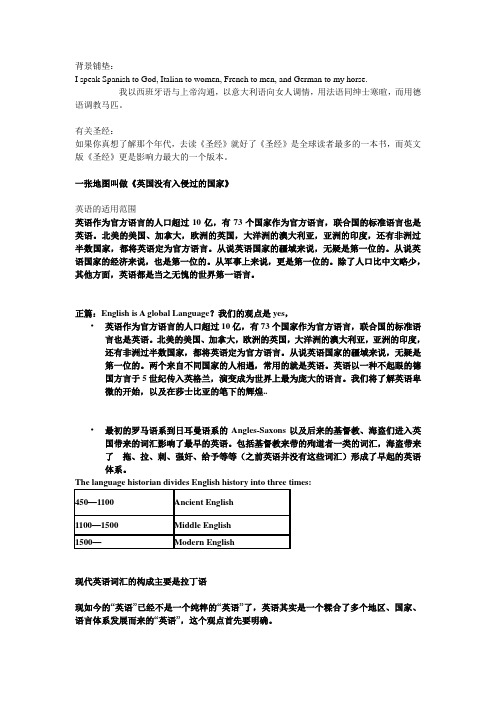
背景铺垫:I speak Spanish to God, Italian to women, French to men, and German to my horse.我以西班牙语与上帝沟通,以意大利语向女人调情,用法语同绅士寒暄,而用德语调教马匹。
有关圣经:如果你真想了解那个年代,去读《圣经》就好了《圣经》是全球读者最多的一本书,而英文版《圣经》更是影响力最大的一个版本。
一张地图叫做《英国没有入侵过的国家》英语的适用范围英语作为官方语言的人口超过10亿,有73个国家作为官方语言,联合国的标准语言也是英语。
北美的美国、加拿大,欧洲的英国,大洋洲的澳大利亚,亚洲的印度,还有非洲过半数国家,都将英语定为官方语言。
从说英语国家的疆域来说,无疑是第一位的。
从说英语国家的经济来说,也是第一位的。
从军事上来说,更是第一位的。
除了人口比中文略少,其他方面,英语都是当之无愧的世界第一语言。
正篇:English is A global Language?我们的观点是yes,•英语作为官方语言的人口超过10亿,有73个国家作为官方语言,联合国的标准语言也是英语。
北美的美国、加拿大,欧洲的英国,大洋洲的澳大利亚,亚洲的印度,还有非洲过半数国家,都将英语定为官方语言。
从说英语国家的疆域来说,无疑是第一位的。
两个来自不同国家的人相遇,常用的就是英语。
英语以一种不起眼的德国方言于5世纪传入英格兰,演变成为世界上最为庞大的语言。
我们将了解英语卑微的开始,以及在莎士比亚的笔下的辉煌..•最初的罗马语系到日耳曼语系的Angles-Saxons以及后来的基督教、海盗们进入英国带来的词汇影响了最早的英语。
包括基督教来带的殉道者一类的词汇,海盗带来了拖、拉、刺、强奸、给予等等(之前英语并没有这些词汇)形成了早起的英语体系。
现代英语词汇的构成主要是拉丁语现如今的“英语”已经不是一个纯粹的“英语”了,英语其实是一个糅合了多个地区、国家、语言体系发展而来的“英语”,这个观点首先要明确。
英语成为全球通用语言的原因2

英语作为全球通用语 的地位是无可否认的。
英语全球通用语 的形成与英国殖民时期的语言扩张政策, 与20世纪美国的强盛及其他英语国家的崛起, 以及全球一体化进程的加速等因素密不可分。
英语语言本身也具备成为全球通用语的先天优势。
1066 年,欧洲大陆的诺曼在最近50 多年里, 英语已成为全球通用的语言, 现在, 全世界大约有114 的人在说英语, 也就是巧亿。
其中4 亿人将英语作为母语, 还有4 亿人将它作为第二语言, 另外可能有10 亿人将英语当作外语来。
英语已经达到了其他语种前所未有的重要地位。
英语是联合国使用频率最高的工作语言。
世界上半数以上的书籍和314 的国际邮件是用英语写的,英语是国际贸易和运输使用的语言。
当令世界上尖端科学的研究和成果都是用英语交流和发表的。
公爵威廉渡海征服了英国。
诺曼人的征服使英语的自然演进过程被打断,大陆的法语逐渐成为英国的官方语言,法语之下还有教会和学术界通用的拉丁语。
此时,英语虽然仍是英国通用的三种语言之一,但却是三种语言中最不受重视的一种。
法语和拉丁语是上流社会的语言,而英语只是为英国下层普通民众所使用。
这种状况差不多持续了三个世纪。
直到1362 年,国会第一次正式用英语开会,同年颁布的法庭辩护法令((Statute ofPleading)规定一切法庭诉讼都必须使用英语[2]7,这才恢复了英语的官方语言地位。
英语成为全球化的语言,除了她自身具有词汇量丰富、表达能力强、较易学习等优点还由历史的原因和英语国家在政治、经济及文化领域的巨大影响以及近年来信息全球化、经济全球化大潮的推动。
正如斯大林所说:“语言是属于社会现象的”,“语言是随着社会的产生和发展而产生发展”。
因此,“要了解语言及其规律,必须把语言同社会的历史,同创造这种语言、使用这种语言人民的历史密切联系起来研究在殖民×义时代,英国(后来也包括美国)有计划或无计划地向世界各地输出其英语文化。
传播英国语言,文化,价值观念和宗教思想的传教士总是走在殖民×义者的前面。
介绍英语的英语作文

介绍英语的英语作文英文回答:English is a global language spoken by over 1.5 billion people worldwide. It is the official language of 59countries and is widely used in business, education, travel, and communication. As a result, learning English has become an essential skill for anyone who wants to succeed intoday's interconnected world.There are many reasons to learn English. For one, itcan help you to communicate with people from all over the world. English is the lingua franca of international business, diplomacy, and academia. If you can speak English, you will be able to connect with people from different cultures and backgrounds, and to share your ideas and experiences with a global audience.Learning English can also help you to advance your career. Many employers now require their employees to haveat least a basic level of English proficiency. By improving your English skills, you can open up new job opportunities and increase your earning potential.In addition to its practical benefits, learning English can also be a rewarding and enjoyable experience. It can help you to develop your cognitive skills, such as your memory, attention, and problem-solving abilities. It can also help you to expand your knowledge of the world and to appreciate different cultures.If you are interested in learning English, there are many resources available to help you. You can take classes at a local community college or university, or you can study online with a variety of different programs. You can also practice speaking English with friends, family, or colleagues, or by joining a conversation group.Learning English takes time and effort, but it is a worthwhile investment that can benefit you in many ways. By improving your English skills, you can open up new opportunities for yourself, both personally andprofessionally.中文回答:英语作为一种全球性语言,全球范围内有超过15亿人使用。
英语成为全球通用语言的原因2

英语作为全球通用语 的地位是无可否认的。
英语全球通用语 的形成与英国殖民时期的语言扩张政策, 与20世纪美国的强盛及其他英语国家的崛起, 以及全球一体化进程的加速等因素密不可分。
英语语言本身也具备成为全球通用语的先天优势。
1066 年,欧洲大陆的诺曼在最近50 多年里, 英语已成为全球通用的语言, 现在, 全世界大约有114 的人在说英语, 也就是巧亿。
其中4 亿人将英语作为母语, 还有4 亿人将它作为第二语言, 另外可能有10 亿人将英语当作外语来。
英语已经达到了其他语种前所未有的重要地位。
英语是联合国使用频率最高的工作语言。
世界上半数以上的书籍和314 的国际邮件是用英语写的,英语是国际贸易和运输使用的语言。
当令世界上尖端科学的研究和成果都是用英语交流和发表的。
公爵威廉渡海征服了英国。
诺曼人的征服使英语的自然演进过程被打断,大陆的法语逐渐成为英国的官方语言,法语之下还有教会和学术界通用的拉丁语。
此时,英语虽然仍是英国通用的三种语言之一,但却是三种语言中最不受重视的一种。
法语和拉丁语是上流社会的语言,而英语只是为英国下层普通民众所使用。
这种状况差不多持续了三个世纪。
直到1362 年,国会第一次正式用英语开会,同年颁布的法庭辩护法令((Statute ofPleading)规定一切法庭诉讼都必须使用英语[2]7,这才恢复了英语的官方语言地位。
英语成为全球化的语言,除了她自身具有词汇量丰富、表达能力强、较易学习等优点还由历史的原因和英语国家在政治、经济及文化领域的巨大影响以及近年来信息全球化、经济全球化大潮的推动。
正如斯大林所说:“语言是属于社会现象的”,“语言是随着社会的产生和发展而产生发展”。
因此,“要了解语言及其规律,必须把语言同社会的历史,同创造这种语言、使用这种语言人民的历史密切联系起来研究在殖民×义时代,英国(后来也包括美国)有计划或无计划地向世界各地输出其英语文化。
传播英国语言,文化,价值观念和宗教思想的传教士总是走在殖民×义者的前面。
英语作为全球性语言的优缺点的口语作文

英语作为全球性语言的优缺点的口语作文全文共6篇示例,供读者参考篇1English as a Global Language: The Good and the BadHi, my name is Emma and I'm 10 years old. My teacher Mrs. Smith asked us to write about whether English should be the global language of the world. She said we should talk about the good things and bad things about it. Here's what I think!First of all, what does global language even mean? I looked it up and it means a language that is spoken all over the world by lots of different people. English is kind of like that already. People use it to talk to each other in different countries. On TV, I hear English in movies, shows, video games, and even songs!So why is English becoming a global language? I think the biggest reason is because of America. The United States is a really powerful and important country. English is the main language there, so it spread to other places through business, technology, entertainment and stuff like that. The internet also helped spread English to every corner of the world.But English isn't just an American thing. It actually started in England, which is where the name comes from! The British Empire alsoget English around to its colonies years and years ago. So between the U.S. and Britain, English got its foot in the door all over the map.Now let me tell you some of the good things about having a global language like English. The best thing is that it allows people from different countries, cultures and backgrounds to communicate. If we didn't have a common language, it would be really hard to share ideas and understand each other. Having English makes it easier for the whole world to connect.It's also really useful for things like technology, science, business and travel. Computer programmers need to use English for coding. Scientists share research in English. Companies use English to trade and make deals across borders. And just try getting around to different countries without knowing any English - it's tough! Having one global language helps a ton for important stuff like that.Another good thing about English is how many people already speak it or are learning it. I read that there are over a billion English speakers in the world, including both native speakers and people who learned it as a second language. That'slike one out of every six human beings! The more people use it, the more useful it becomes for bringing everyone together. It's kind of a cycle that keeps going.So those are some of the pros, but what about the cons? Well, one downside is that learning English is hard, especially for kids. It has a bunch of weird spelling rules, funny pronunciations, and strange sentence structures. For people whose native language is really different, getting used to English can take a lot of work. That's not very fair.There's also a worry that forcing English on everyone could mean that other languages get left behind or even go extinct over time. Imagine if kids stopped learning their family's language because they only had to focus on English? We could lose some of the world's amazing cultures and histories. That would be really sad.Plus, people argue that making English the global language gives certain countries and cultures more power and influence over others. Is it right that American TV, movies, and social media gets pushed on people from totally different societies? Some think it's a form of forcing Western values on the rest of the planet.Those are some of the cons, but there are probably more. Overall though, I can see why English has become a common language for the world. It's extremely useful and helps us communicate and share things globally. But we have to be careful not to let it overtake other languages and make sure everyone has a fair chance to learn it properly.Ultimately, I don't think having a global language is bad as long as we also respect everyone's home languages and cultures. If English is a way for us to interact and work together while still appreciating diversity, then it can be a really good thing. But if it's forced on people unfairly, that could be a problem.Whew, that was a long essay! I hope I covered the key points well enough. English may not be perfect as a global language, but it's definitely here to stay for now. The important thing is being respectful of all the other amazing languages out there. What did you think of my essay? Let me know!篇2English is Like, The Language of The Whole World!Hi guys! Today I want to talk to you about English. It's like, the language that everyone around the world uses tocommunicate with each other. It's really cool, but it also has some not so cool parts too. Let me tell you all about it!First of all, the best thing about English being a global language is that it helps people from different countries understand each other. Like, if I'm from America and you're from China, and neither of us knows how to speak the other person's language, we can both use English to chat and become friends! Isn't that awesome?It also makes travelling around the world way easier. If you go on a vacation to Italy or Brazil or anywhere else, there's a good chance that some people will be able to speak at least a little bit of English. That means you can ask them for directions, order food at restaurants, and do all that fun travel stuff!Another awesome thing about English is that you can learn about so many cool things because most of the biggest websites, books, movies, video games, and music is in English. Like if you want to watch really popular YouTubers, they usually make their videos in English. Or if you want to read up on dinosaurs or space or anything else, there's way more information online in English than in any other language. It's like a key that unlocks understanding about the whole world!Speaking of the internet, a lot of coding for websites and computer programs also uses English. So if you want to be a coder when you grow up, knowing English is going to be super helpful. Lots of international businesses also use English as their corporate language to make it easier for everyone to communicate together too.But you know what? As awesome as English is, there are also some downsides to having it be the global language of the world. For one thing, it's really, really hard to learn for people whose native language is nothing like English. All those crazy spelling rules and weird grammar bits make no sense! My friend Marco is from Portugal and he says English is one of the most frustrating things he's ever had to learn.It also kind of stinks that English is so dominant, because it makes other cultures and languages feel less important. There are so many beautiful, ancient languages out there like Mandarin, Arabic, Russian, Hindi and more that are a huge part of those people's identities and traditions. But with English being the global language, it can sometimes make those other languages get overlooked and forgotten about. That's not very fair at all.On top of that, there's also a lot of amazing science, poetry, inventions, and knowledge from around the world that hasgotten kind of lost or at least become way less popular just because it wasn't translated into English or made accessible to English speakers. That means we've all missed out on learning and appreciating so much cool stuff!Another problem is that there are soooooo many different ways to speak English with different accents, slang, idioms, and more. That can make it hard for people to always understand each other perfectly, even if they technically know "English." Like, I have a hard time understanding my friend Ravita when she speaks because her English accent is so different from mine. It's kind of an issue when one language has become a global thing but there's still no one uniform way to speak it, if that makes sense.The last big downside of English being the global language is that it gives a small number of certain countries and cultures a lot more influence and power around the world. Knowing English is a skill that leads to better jobs and opportunities. But not every kid around the world has the same chance to learn it or practice speaking it as much as kids from places like the US, UK, Canada, Australia etc. That's not very fair and can make the playing field for life feel kind of uneven.So those are some of the biggest pros and cons I can think of when it comes to English being the language of the world. At the end of the day, I'm honestly not sure if it's a totally good or totally bad thing. There are amazing benefits that make me really grateful English is a global language. But there are also lots of downsides that make me a little sad about it too.What does everyone else think? Do you agree with me or did I miss anything important? Let me know! Maybe together we can figure out if having one global language is the best thing for bringing the whole world closer together or if it actually ends up keeping us apart in some ways. It's definitely something to keep discussing as we all grow up in an increasingly connected and globalized world.Okay, that's all I've got for today guys! Thanks for listening to me ramble on about this very important topic. Mama's calling me for dinner now so I gotta run. But let's pick this back up another time! Peace out!篇3The Ups and Downs of English Being a World LanguageHi there! My name is Emma and I'm a 5th grader. Today I want to talk to you about English being a global language thatpeople use all around the world. There are some really good things about this, but also some not so good things. Let me tell you more!The Awesome Stuff About English Being WorldwideOne of the best things is that English helps people from different countries communicate and understand each other. Like, if I went to France or China or Brazil, I could use English to talk to the kids there. We would be able to make friends and learn about each other's cultures and backgrounds even though our first languages are different. That's really neat!Another plus is that there are so many fun books, movies, video games, and websites in English from all over the world. If English wasn't a global language, we might miss out on lots of those cool things. I love reading stories from authors in India, watching cartoons made in Canada, and playing video games made by companies in Japan. The English language connects me to awesome entertainment from everywhere!English is also really important for jobs nowadays.Grown-ups who want careers in business, technology, science, and a ton of other fields have to know English to communicate internationally. My parents work at companies that deal with people from many countries, so speaking English helps them alot. When I'm older, knowing English will give me more chances to get a good job too.Those are some of the biggest advantages, but there are a few downsides too. Let me explain...The Not So Great StuffWhile English does connect the world in many ways, it can also make people feel left out or looked down on if they don't speak it well. Some people think that if you don't know English, you're not as smart or modern. That makes me sad because every language is important and valuable, not just English.Speaking of languages, another con is that when English becomes so everywhere, it can start to hurt other languages. If everybody just learns English instead of their native languages too, those other cool languages could get forgotten about or even die out eventually. We don't want to lose the amazing diversity of languages in the world!Lastly, since English is the common language for so much stuff now, it can feel like certain cultures are left behind or not represented enough. A lot of movies, music, books, and websites are from countries like the US and UK where English is the mainlanguage. But there are awesome things from everywhere else too that don't always get shared globally as much.Overall, I think English being an international language has more positives than negatives. But we have to be aware of the downsides too and work on including and appreciating ALL languages and cultures. It's about balance - using English to connect people around the world, while also celebrating the wonderful diversity of our planet.Anyway, those are just some thoughts from this 10-year-old kid. Let me know what you think! Do you see other pros and cons to English being so global? I'd love to hear your perspective. Thanks for listening!篇4English as a Global Language: The Good and the BadHi, my name is Emma and today I'm going to talk about English being a global language. That means it's a language used all around the world by lots of different people. There are some really cool things about having one language that everyone can use, but there are also some not-so-cool things too. Let me tell you about them!The Good ThingsOne of the best things about English being a global language is that it makes it easier for people from different countries to communicate and understand each other. Like, if I wanted to make friends with kids from France, China, Brazil, and Egypt, we could all talk to each other in English. Without a common language, it would be really hard for us to have conversations and get to know each other. English is kind of like a bridge that connects people all over the world.Another awesome thing is that knowing English can help you get better jobs and make more money when you grow up. Companies all around the world use English, so if you speak it really well, you can work for businesses in the United States, Australia, India, and loads of other places. You can even work online and talk to clients from everywhere!English is also super useful for traveling. The words, numbers, colours, and basic phrases are the same in English no matter where you go. So if you get lost in Tokyo or want to order food in Egypt, you can use English to ask for help and make yourself understood. That makes traveling way easier.One more good thing is that so many of the best books, movies, video games, and websites are in English. If you knowthe language well, you can read your favorite books without waiting for them to get translated. You can play amazing games and understand all the dialogue. You can watch silly YouTube videos from all over and really get all the jokes. Knowing English opens up a whole world of entertainment!The Bad ThingsWhile English is really useful as a global language, there are some downsides to think about too. One problem is that learning it can be really, really hard - especially speaking and writing correctly. English has weird spellings, confusing grammar rules, and tons of irregular verb forms to memorize. Students have to study for years and years just to get pretty good at it.Another not-so-great thing is that using English all the time might make other languages start to disappear. If everyone just speaks English to each other, smaller languages like Quechua or Navajo could get forgotten about over time. That would be really sad because language is a huge part of culture - losing a language means losing traditions, stories, and history.Having one global language also makes things kind of boring in a way. Traveling somewhere new is amazing, but if everyone you meet just speaks English, you miss out on the adventure of learning new words and ways of communicating.Things start feeling alike everywhere instead of unique and special.Finally, learning English can sometimes make people feel bad about themselves or their culture. Maybe their accent sounds different, or they mix up words in a funny way. Some people might tease them or put them down for not speaking "proper" English. That's just mean and makes people feel excluded when English is supposed to bring people together.The VerdictSo those are some of the big pros and cons of English being a global language. Overall, I think the good things probably outweigh the bad. Being able to communicate with people everywhere is pretty amazing. As long as we respect other languages and cultures too, having English as a common tool is super useful and powerful.What do you all think? Do the pros and cons make sense? I'm sure I missed some key points, so let me know what you would add or change. It's such an interesting topic to discuss! Thanks for listening, everyone. Maybe we can continue this conversation again soon - in English or any other language!篇5English as a Global Language: The Good and the BadHi everyone! Today I want to talk about something really important - English being the global language of the world. It's a super cool thing, but it also has some not-so-cool parts too. Let me explain!The Good Things About English Being GlobalWe Can Talk to People All Over the World!Imagine you're on vacation in France or Japan or Brazil, and you meet some kids who don't speak your native language. But guess what? You can use English to make new friends and communicate with them! English allows us to connect with people from different countries and cultures. Isn't that awesome?It's Helpful for Travel and WorkWhen you grow up, you might want to travel the world or get a job that requires you to go to different places. Knowing English makes that so much easier! It's the language that's understood almost everywhere, so it helps you get around, read signs, understand instructions, and more.So Many Things Are in EnglishA lot of the movies, TV shows, books, video games, and music we love are originally made in English. By learning it, we can enjoy those things without having to rely on translations or subtitles all the time. You can read "Harry Potter" or sing along to your favorite songs in their original language!It's Useful for LearningEnglish is kind of like a key that opens the door to lots of knowledge. So much information on the internet, in books, and in schools is available in English. Mastering it gives you access to learning about any topic you can imagine from experts all around the globe.The Bad Things About English Being GlobalIt Can Make Other Languages DisappearWith so many people focusing on English, there's a risk that other amazing languages will start to get forgotten or won't be learned by new generations. That's really sad because every language is special and an important part of cultures around the world.It's Hard to Learn For Some PeopleEnglish can be a very difficult language with tricky grammar rules, crazy spellings, and lots of exceptions to the rules. For kidsor people whose native language is really different from English, it takes a huge amount of time and work to get good at it.Some People Feel Left OutIf you don't know English well, it can sometimes feel like you're being left out or left behind in a world where English is everywhere. That's not fair, and it makes things harder for people who haven't had the chance to learn it properly yet.There Are Many Different VersionsYou know how British English is a little different from American English, and they're both different from Australian English? Having so many varieties of English can lead to misunderstandings and confusion sometimes, even among people who all speak "English."Overall, I think English as a global language is adouble-edged sword. It connects the world and creates awesome opportunities, but we have to be careful not to let it overshadow all the other incredible languages that exist. The best thing is for people to learn multiple languages while still preserving their native tongues and cultures.Knowing English gives you a superpower for communicating across the globe, but we should celebrate all of our languages,not just English. What do you think? I'd love to hear your opinion on this big, complicated topic!篇6English as a Global Language: The Good and the BadHi everyone! My name is Emma and I'm going to talk to you today about English being a global language. That means it's a language that lots of people all around the world speak and understand. Pretty cool, right? But like with most things, there are some good points and some not-so-good points about it. Let me tell you what I think!The Good ThingsOne of the biggest good things about English being a global language is that it makes it way easier for people from different countries to communicate and understand each other. Can you imagine how hard it would be if everyone spoke a totally different language? It would be so confusing! But with English, people can talk to each other, share ideas, make new friends, and learn about each other's cultures. That's really awesome if you ask me.Another plus is that knowing English can help you get better jobs and make more money. These days, lots of companies want employees who can speak English, especially if the company does business in many different countries. Knowing the global language gives you an advantage over people who don't speak it. You can work all sorts of cool places too if you know English!Speaking of travel, that's another great benefit of English being so widespread. When you go abroad, there's a pretty good chance lots of people will understand at least some English. That makes getting around, asking for directions, ordering food, and just having fun so much simpler as a tourist. You don't have to learn twenty different languages just to see the world.Having one super common global language also makes it easier to share entertainment like movies, TV shows, music, and books across cultures. If they're all in English, way more people can understand and enjoy them. Pretty neat, right? And sharing culture through media is a fantastic way for the world to connect.The Bad ThingsOn the flip side, there are some definite downsides to English dominating as the global lingua franca (that's a fancy phrase for a language used all over the world). One problem is that it can sometimes feel like English is being forced onto othercultures unfairly. If you have to learn it just to get a good job or opportunity, that doesn't really seem fair to speakers of other languages, does it?There's also a risk that having one super common global language could mean other amazing languages might get neglected or even die out over time. That would be such a huge loss for cultural diversity! Every language is special and important.Speaking English as a second or third language can also be really hard. It has weird spellings, illogical grammar rules, and doesn't always make a ton of sense. No wonder so many people struggle to master it! That difficulty can make non-native speakers feel insecure or left out at times.Lastly, having one language that's so dominant globally can potentially spread one culture's values and perspectives over others. Sure, English spreads Western ideas and media far and wide. But is that fair to other cultures? It's something to think about for sure.My ThoughtsThose are some of the major pros and cons as I see them when it comes to English being the world's lingua franca.Personally, I can definitely see the benefits it brings in connecting people and cultures. Getting to watch my favorite movies and shows from the US and UK is super fun! And hopefully learning it well will help me get a cool job someday.At the same time, I do feel a bit bad that English seems to be slowly taking over in some ways. I really value cultural diversity and want to see other amazing languages continue to thrive too. Maybe there's a happy balance we can find where English links the globe while still respecting all the other precious languages out there.But those are just my thoughts as a kid! What do you all think about the plusses and minuses of a global language like English? I'd love to hear your perspectives. It's definitely a fascinating topic to discuss and think about. Thanks for listening!。
非常有价值的英语

非常有价值的英语English: English is a global language that is incredibly valuable for communication, education, and business.Chinese: 英语是一种全球语言,对于沟通、教育和商业非常有价值。
English: Being able to speak English opens up a world of opportunities and allows individuals to connect with people from all corners of the globe.Chinese: 能够说英语打开了无限的机会,让个人可以与来自世界各地的人们建立联系。
English: English is not just a language, but also a gateway to different cultures and traditions, offering a deeper understanding of the world we live in.Chinese: 英语不仅仅是一种语言,还是了解不同文化和传统的门户,为我们生活在的世界提供了更深的认识。
English: In today's interconnected world, proficiency in English is a valuable skill that is highly sought after by employers in various industries.Chinese: 在当今互联互通的世界中,精通英语是一项非常有价值的技能,受到各行各业雇主的高度追捧。
English: By mastering English, individuals can access a wealth of information and knowledge that is only available in English, from academic journals to popular culture.Chinese: 通过掌握英语,个人可以获得大量只有用英语才能获得的信息和知识,从学术期刊到流行文化。
英语作为全球语言的原因英语作文

英语作为全球语言的原因英语作文全文共3篇示例,供读者参考篇1English as a Global Language: Reasons and ImplicationsEnglish is undoubtedly the most widely spoken language in the world today. It is the lingua franca of international business, diplomacy, science, technology, and entertainment. In fact, English is spoken by nearly 1.5 billion people worldwide, making it the third most spoken language after Mandarin Chinese and Spanish. But what are the reasons behind English's global dominance as a language? In this essay, we will explore the historical, cultural, economic, and political factors that have contributed to English becoming the global language that it is today.One of the main reasons for English's global supremacy is its historical roots. The rise of the British Empire in the 16th century led to the widespread adoption of English in colonies across Asia, Africa, and the Americas. As a result, English became the language of trade, administration, and education in these regions, ensuring its continued influence long after the declineof the British Empire. The spread of English was further accelerated by the rise of the United States as a superpower in the 20th century, with American English becoming the dominant form of the language in many global industries.Another factor that has contributed to English's global popularity is its versatility and adaptability. English is a rich and diverse language that has borrowed words from a wide range of other languages, including Latin, French, German, and Spanish. This makes English a highly flexible language that can easily incorporate new words and concepts from different cultures and disciplines. In addition, English has a relatively simple grammar and a large vocabulary, making it accessible to speakers of other languages who may find languages with more complex grammar systems, such as Russian or Arabic, more challenging to learn.The rise of the internet and digital communication has also played a significant role in promoting English as a global language. The majority of online content is in English, from news articles and social media posts to academic journals and e-books. This means that people around the world are constantly exposed to English in their daily lives, leading to increased proficiency and fluency in the language. In addition, many of the most popular websites and online platforms, such as Google, Facebook, andTwitter, are based in English-speaking countries, further reinforcing the dominance of English in the digital space.Furthermore, the global reach of English has been facilitated by the widespread adoption of English as a second language in schools and universities around the world. English is often a compulsory subject in many countries, and proficiency in English is seen as a valuable skill for both personal and professional development. As a result, millions of people are learning English as a second language, leading to a continuous growth in the number of English speakers worldwide.The implications of English's global dominance as a language are far-reaching and complex. On the one hand, English serves as a common language that allows people from different countries and cultures to communicate and interact with each other. This can help to promote understanding and cooperation on a global scale, as well as facilitate the exchange of ideas and information across borders. In addition, English is often used as a medium of instruction in universities, research institutions, and multinational corporations, giving those who are proficient in English a competitive advantage in the global job market.However, the widespread use of English as a global language also raises concerns about linguistic diversity and cultural homogenization. As English becomes more dominant in the world, there is a risk that other languages and dialects may be marginalized or even endangered. This can lead to the loss of unique cultural and linguistic traditions that are an important part of the world's heritage. In addition, the dominance of English can create inequalities between native English speakers and non-native speakers, as proficiency in English is often seen as a measure of intelligence or competence in many contexts.In conclusion, English has become the global language of the 21st century due to a combination of historical, cultural, economic, and political factors. Its widespread use and influence have both positive and negative consequences for global communication and interaction. While English has the power to connect people and facilitate cooperation across borders, it also has the potential to marginalize other languages and cultures. Therefore, it is important to recognize the value of linguistic diversity and to promote multilingualism in a globalized world.篇2The Reason for English as a Global LanguageEnglish is considered the global language for a number of reasons. The prominence of English as a global language can be attributed to several historical, political, economic, and cultural factors. In this essay, we will explore the reasons why English has become the universal language of the world.One of the main reasons for English to become the global language is its historical development. The British Empire, at its height, covered a large portion of the globe and brought the English language to many countries. English was adopted as the official language in these colonies and has since become the lingua franca in many regions. The spread of English through colonialism has left a lasting legacy on the world, making English a widely spoken and understood language.In addition to its historical development, English has also become the global language due to its political importance. The United States, as one of the world's superpowers, has played a significant role in promoting the use of English as the global language. English is the official language of many international organizations, such as the United Nations and the European Union, further solidifying its status as the global language of diplomacy and politics.Economics also plays a role in English's global dominance. English is the language of international business and trade, with many multinational corporations conducting their operations in English. Proficiency in English is seen as a valuable skill in the global job market, leading to an increased demand for English language education and training. As a result, English has become the language of commerce and finance, further cementing its position as the global language.Cultural factors have also contributed to the rise of English as a global language. English is the language of popular culture, with Hollywood films, British music, and American television dominating the global entertainment industry. The influence of English-language media has spread English to all corners of the world, making it a language that is widely understood and spoken by people of different cultures and backgrounds.In conclusion, English has become the global language due to its historical development, political importance, economic significance, and cultural influence. As the world becomes increasingly interconnected, the importance of English as a universal language will continue to grow. In order to thrive in the globalized world, proficiency in English is essential. English is not just a language, but a tool for communication, collaboration, andunderstanding across borders. As such, it is no wonder that English has become the global language of the 21st century.篇3English as a Global LanguageEnglish is one of the most widely spoken languages in the world, with over 1.5 billion speakers across the globe. It is the official language in many countries and is used as a second language by people in countries where it is not the primary language. This phenomenon has led to English being considered the global language of communication, business, and international relations.There are several reasons why English has become the global language it is today. One of the main reasons is the historical and political influence of the British Empire. During the 19th and early 20th centuries, the British Empire had colonies in various parts of the world, including North America, India, Africa, and Australia. The British imposed English as the official language in these colonies, and it became the language of administration, education, and commerce. As a result, many people in these regions learned English as a second language, and it eventuallybecame a lingua franca for communication among different ethnic groups.Another reason for the global dominance of English is the economic power of English-speaking countries such as the United States and the United Kingdom. These countries are major players in the global economy and have a strong influence on international trade, finance, and culture. As a result, English has become the language of business and commerce, and proficiency in English is seen as a key skill for success in the global marketplace. Many multinational companies use English as their official language for communication, and employees are often required to speak English fluently in order to work for these companies.In addition, English is the language of science, technology, and academia. Many research papers, articles, and conferences are conducted in English, and scholars from around the world use English to communicate their findings and collaborate with colleagues. As a result, proficiency in English is essential for anyone working in these fields, regardless of their native language. English is also the language of the internet, with a majority of websites, social media platforms, and online content being in English. This widespread use of English in the digitalrealm has further solidified its status as the global language of communication.Furthermore, English is a highly adaptable and versatile language that has borrowed words and phrases from many other languages over the centuries. This flexibility allows English to evolve and incorporate new vocabulary and expressions, making it suitable for use in a wide variety of contexts and industries. English also has a relatively simple grammar and straightforward pronunciation, making it easier for non-native speakers to learn and communicate in the language.Despite the dominance of English as a global language, there are concerns about the potential cultural and linguistic homogenization that may result from the spread of English. Some critics argue that the dominance of English marginalizes other languages and cultures, leading to a loss of diversity and heritage. However, proponents of English as a global language argue that it promotes communication and understanding among people from different backgrounds and facilitates cooperation and collaboration on a global scale.In conclusion, English has become the global language it is today due to a combination of historical, political, economic, and cultural factors. Its widespread use in commerce, academia,technology, and the internet has solidified its status as the lingua franca of the modern world. While there are valid concerns about the impact of English dominance on other languages and cultures, it is clear that English will continue to play a crucial role in communication and interaction among people around the world in the foreseeable future.。
英语能够帮助全世界的人交流的英语作文

英语能够帮助全世界的人交流的英语作文English is a global language that can help people from all over the world communicate effectively. It is the most widely spoken language in the world and is used as a second language by many people. The ability to speak English opens up a world of opportunities for individuals, allowing them to connect with people from different cultures and backgrounds. Here are a few ways in which English can help people communicate on a global scale.Firstly, English is the language of international business. Many multinational companies and organizations use English as their primary language for communication. This means that having a good command of English can open up employment opportunities and allow individuals to work in a global context. It also enables people to attend international conferences, negotiate business deals, and collaborate with colleagues from different countries.Secondly, English is the language of technology and innovation. Many scientific journals, research papers, and technological advancements are published in English. Thismeans that individuals who can read and understand English can stay updated on the latest developments in their field and contribute to global discussions and collaborations. It also allows them to access online resources, connect with experts, and participate in global research projects.Thirdly, English is the language of travel and tourism. When traveling to different countries, English can serve as a common language for communication. It allows individuals to ask for directions, order food, and engage in conversations with locals. It also enables them to read signs, menus, and maps, making their travel experience much smoother and more enjoyable. Additionally, English-speaking tour guides and travel agents can help travelers navigate new destinations and learn about the local culture and history.Finally, English is the language of education and academia. Many universities and educational institutions around the world offer courses and programs in English. This means that individuals who are proficient in English have access to a wider range of educational opportunities, including scholarships, research grants, and study abroadprograms. It also allows them to connect with students and professors from different countries, engage in academic discussions, and contribute to global knowledge and understanding.总之,英语是一种全球性的语言,能够帮助全世界的人交流。
英语重要性的英语作文
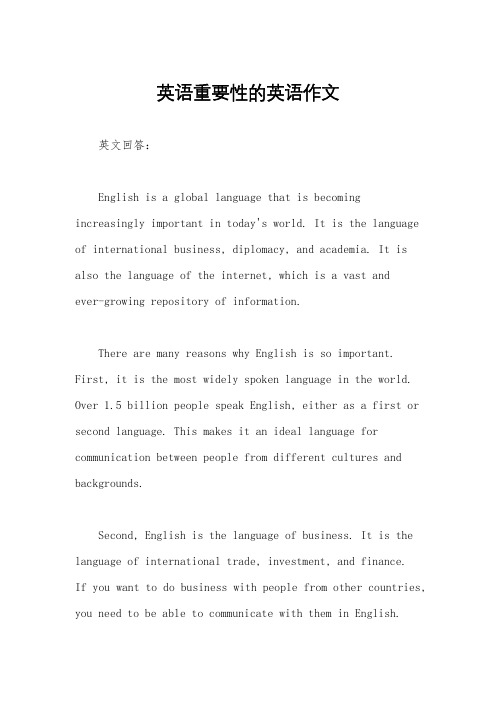
英语重要性的英语作文英文回答:English is a global language that is becoming increasingly important in today's world. It is the language of international business, diplomacy, and academia. It is also the language of the internet, which is a vast andever-growing repository of information.There are many reasons why English is so important. First, it is the most widely spoken language in the world. Over 1.5 billion people speak English, either as a first or second language. This makes it an ideal language for communication between people from different cultures and backgrounds.Second, English is the language of business. It is the language of international trade, investment, and finance.If you want to do business with people from other countries, you need to be able to communicate with them in English.Third, English is the language of diplomacy. It is the language of the United Nations and other international organizations. If you want to be involved in international affairs, you need to be able to speak English.Fourth, English is the language of academia. It is the language of scientific research, higher education, and scholarly publishing. If you want to pursue a higher education or a career in research, you need to be able to read and write English.Finally, English is the language of the internet. The vast majority of websites are written in English. If you want to access the wealth of information available on the internet, you need to be able to read and understand English.In conclusion, English is an important language for a variety of reasons. It is the language of international business, diplomacy, academia, and the internet. If you want to succeed in today's world, you need to be able tospeak, read, and write English.中文回答:英语是全球语言,在当今世界变得越来越重要。
英语是否作为全球性语言英文作文

英语是否作为全球性语言英文作文The Role of English as a Global Language.In today's interconnected world, the significance of a common language for communication and understanding is paramount. English, with its widespread adoption and use, has emerged as the de facto global language. Its dominance is not just a linguistic phenomenon; it is a cultural, economic, and technological reality that shapes the way we interact with each other in the modern era.The history of English's rise to global prominence dates back to the colonial era, when the British Empire spanned vast territories around the world. As a result, English became the language of administration, trade, and education in many of these territories. Over time, this linguistic legacy persisted, even after the decline of the British Empire, due to the enduring influence of the language in international affairs, business, and academia.One of the key factors contributing to English's global status is its use as a lingua franca. In a world where people from diverse linguistic backgrounds need to communicate, English often serves as a common denominator. Whether it's in international conferences, business.。
雅思作文素材库---英语是否已成国际语言
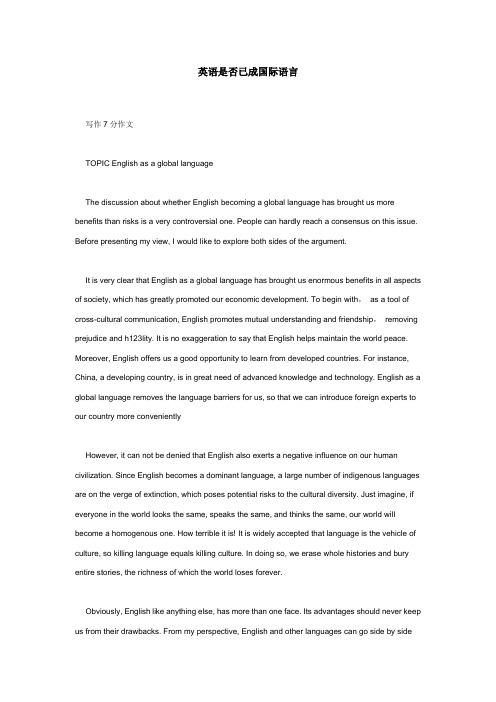
英语是否已成国际语言写作7分作文TOPIC English as a global languageThe discussion about whether English becoming a global language has brought us more benefits than risks is a very controversial one. People can hardly reach a consensus on this issue. Before presenting my view, I would like to explore both sides of the argument.It is very clear that English as a global language has brought us enormous benefits in all aspects of society, which has greatly promoted our economic development. To begin with,as a tool of cross-cultural communication, English promotes mutual understanding and friendship,removing prejudice and h123lity. It is no exaggeration to say that English helps maintain the world peace. Moreover, English offers us a good opportunity to learn from developed countries. For instance, China, a developing country, is in great need of advanced knowledge and technology. English as a global language removes the language barriers for us, so that we can introduce foreign experts to our country more convenientlyHowever, it can not be denied that English also exerts a negative influence on our human civilization. Since English becomes a dominant language, a large number of indigenous languages are on the verge of extinction, which poses potential risks to the cultural diversity. Just imagine, if everyone in the world looks the same, speaks the same, and thinks the same, our world will become a homogenous one. How terrible it is! It is widely accepted that language is the vehicle of culture, so killing language equals killing culture. In doing so, we erase whole histories and bury entire stories, the richness of which the world loses forever.Obviously, English like anything else, has more than one face. Its advantages should never keep us from their drawbacks. From my perspective, English and other languages can go side by sidewith each other, each shi nning more brilliantly in the other’s company.吴建业老师的点评:1.结构合理。
全球语

所以,是将全球语视为一种新的国际性语言,还是将其视为英语的一种简化形式,这取决于我们 如何定义语言。在我们的定义中,语言是否应该是一种文化的独特表达方式,还是应该是一种能 够简单、有效地进行沟通的工具?
崛起
全球语崛起的趋势首次于2005年鲜明呈现。当时,丹麦《日德兰邮报》连载拿伊斯兰先知穆罕默 德开玩笑的漫画,引起穆斯林世界强烈挞伐。大批穆斯林聚集在丹麦驻伦敦大使馆外,举着英文 抗议标语,包括“BUTCHER THOSE WHO MOCK ISLAM(宰了那些嘲弄伊斯兰的人)”、 “FREEDOM OF EXPRESSION GO TO HELL(言论自由去死)”等等。这些标语文法可能有些问题, 在英美人士眼中也不够地道,但稍懂英文的人都能了解,也透过媒体让示威者理念传遍全球。
这个问题就像是在语言的大海中抛下的一枚石子,激起的波澜逐渐扩散开来。语言,既是文化的 载体,也是思想的工具。每当一种新的语言出现,都会带来新的思考方式,新的观察视角。全球 语的出现,是否会带来这样的变革?
我们看到,全球语的优点在于其简单明了,易于理解。无论你的母语是什么,只要你能说英语, 你就能毫无困难地理解全球语。在这个全球化的时代,这种特性让沟通变得更加顺畅,无论是在 商业交流,还是在文化交流中,都能发挥出巨大的优势。
背景介绍
全球语
全球能说某种程度英语的人口将近40亿,占全球总人口三分之二,而其中以英语为母语只有4亿 人。在经济及文化迅速全球化的时代,跨国来往频繁,加上络聊天室、手机等,都让需要与外国 人沟通、英语却没有那么流利的人开始逐渐发展出“全球语”。
- 1、下载文档前请自行甄别文档内容的完整性,平台不提供额外的编辑、内容补充、找答案等附加服务。
- 2、"仅部分预览"的文档,不可在线预览部分如存在完整性等问题,可反馈申请退款(可完整预览的文档不适用该条件!)。
- 3、如文档侵犯您的权益,请联系客服反馈,我们会尽快为您处理(人工客服工作时间:9:00-18:30)。
Lantin Portuguese
English
Contents
Is English a global language? Illustrate the fact that the globalization of English
What makes English a global language?
1.Distribution of the world's languages
Illustrate the fact that the globalization of English
2.more than 70 countries gave the official status to English
English is more and more important for us. We must learn English well, but at the same time ,we should not forget to learn our own culture.
Illustrate the fact that the globalization of English
3.English gains ascendancy over other foreign languages in foreign language teachings in more than 100 countries.
Add your title in here
Add your title in here
Illustrate the fact that the globalization of English
• Click to add Text • Click to add Text • Click to add Text • Click to add Text • Click to add Text • Click to add Text • Click to add Text
English
The negative impact of the globalization of English Is English will always the global language?
Conclusion
Is English a global language?
English is undoubtedly an international language, either from the Yes,it is! perspective of history or the present.
What makes English a global language?
English
The negative impact of the globalization of English Is English will always the global language?
Conclusion
Illustrate the fact that the globalization of English
Conclusion
What makes English a global language?
The establishment of a language as an international language mainly relies on the political dominance, especially the military power of the people who speak it.
• Click to add Text
• Click to add Text
•Who are they ?o add
Text • Click to add Text • Click to add Text
Illustrate the fact that the globalization of English
Is English A Global Language ?
LOGO
Contents
Is English a global language? Illustrate the fact that the globalization of English
What makes English a global language?
What makes English a global language?
English
The negative impact of the globalization of English Is English will always the global language?
Conclusion
Conclusion
4.Statistics show that 75% of the world's TV channels are in English, and 85% of international organizations’ working language is English. Moreover, 85% of the page is the English pages, and 85% of science and technology information uses English to exchange.Even 100% of the softw are source codes are in English format.
Conclusion
Is English will always carry on with its international influence?
Contents
Is English a global language? Illustrate the fact that the globalization of English
Contents
Is English a global language? Illustrate the fact that the globalization of English
What makes English a global language?
English
The negative impact of the globalization of English Is English will always the global language?
pk
Custom
Contents
Is English a global language? Illustrate the fact that the globalization of English
What makes English a global language?
English
The negative impact of the globalization of English Is English will always the global language?
Illustrate the fact that the globalization of English
2.more than 70 countries gave the official status to English
Mauritius 毛里求斯 Micronesia 密克罗尼西亚 Namibia 纳米比亚 Nigeria 尼日利亚 Pakistan (with Urdu) 巴基斯坦(乌尔都语) Add your title in here Papua New Guinea (with Motu) 巴布亚新几内亚(莫图土语) Philippines (with Tagalog) 菲律宾(他加禄语) Saint Kitts and Nevis 圣基茨和尼维斯 Saint Lucia 圣卢西亚 Saint Vincent and the Grenadines 圣文森特和格林纳丁斯 Sierra Leone 塞拉利昂 Add your title in here Singapore (with Malay and Chinese) 新加坡(马来语和汉语) Solomon Islands 所罗门 Tanzania (with Swahili) 坦桑尼亚(斯瓦希里语) Trinidad and Tobago 特立尼达和多巴哥 Uganda 乌干达 Vanuatu 瓦努阿图 Zambia 赞比亚 Zimbabwe 津巴布韦
English is undoubtedly an international language, either from the perspective of history or the present. Add your title in here
Contents
Is English a global language? Illustrate the fact that the globalization ofegative impact of the globalization of English Is English will always the global language?
Conclusion
The negative impact of the globalization of English
Food
The negative impact of the globalization of English
More and more young people choose to be romantic at 2.14 Valentine’s Day, but they forget theTanabata festival on the seventh evening of the seventh moon in lunar calendar.
